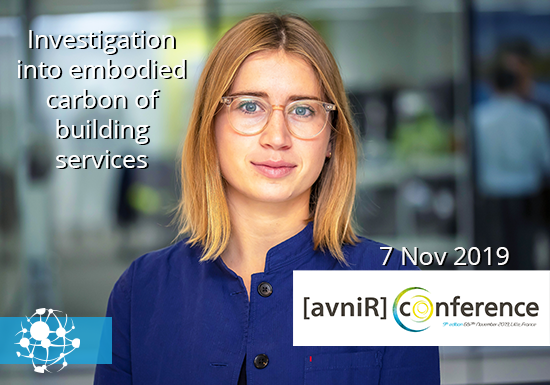Louise Hamot tops the speaker list at Avnir Conference in Lille, France

The LCA methodologies for sustainable building
The future building regulations planned for 2021 will not be just energy like RT2012 but will incorporate environmental criteria.
During this session, you will have an overview of the experiments already carried out to prepare for this transition: the first returns of the E+C- label, which prefigures this future regulation for the new, the presentation of a comparative study of the carbon impacts of energy systems. heating and an example of taking into account the LCA in a social housing rehabilitation market.
For more information click Here.
Speakers:
Investigation into embodied carbon of building services
Louise HAMOT
MSc. Eng, M.Arch,
Sustainability Consultant & Environmental Designer at Elementa Consulting, London
Louise holds a double diploma in Architecture and Engineer in Building/Urban Physics from France and works as a Sustainability Consultant and Environmental Designer. She gained strong experience in regenerative, biophilic, healthy materials by working at McLennan Design, an architecture practice based in Seattle (USA) created by the founder of the Living Building Challenge, and by studying at the Technische Universität of Darmstadt (Germany), home of Passivhouse label. She is involved in different International Living Future collaboratives in Europe and publications about whole life carbon in the building industry.
Contribution to building LCA thanks to the positive energy and low carbon french experimentation
Mathilde LOUËRAT
Paris Est University, Scientific and Technical Center for Building Construction (CSTB), Grenoble, France

After a PhD in heat and moisture transfer in bio-based materials, Mathilde joined the CSTB (French Scientific and Technical Centre for Building) in 2017 as a research engineer of the LCA team. She studies and assesses environmental impacts of buildings. She is involved in several projects to carry out or audit LCAs of new or renovated buildings. She co-develops methodology tools for renovated building LCA. She also works for the establishment of the E+C- label (positive Energy and low Carbon) for buildings. She combines assessment and support missions for members of the construction industry. For example, she co-develops data analysis tools to operate the environmental, energy and economic performance of buildings national database.
LCA as a criterion for judging offers
Romain VERMAUT In charge of Energy transition, sustainable development and innovation, Lille Métropole Habitat


Romain VERMAUT, an engineer in building materials, geotechnics and civil engineering, has been in charge since 2016 of the energy transition and innovation within the Development and Heritage Department. Drawing on his ten years of experience as an operations manager (new and rehabilitation), he develops cross-functional projects, implements tools, monitoring and evaluation procedures, raises awareness among teams on transition topics energy efficiency and draws up action plans to improve the company’s performance in the energy field and sustainable development. It manages energy saving certificates and monitors the evolution and integration of LCA in the context of new constructions and réhabilitations.
Rebond effects on life cycle assessment of a french single family house refurbishment : the bat -eco2 case study
Carolina DA ROCHA COLLI



3rd-year PhD student at the LGCgE laboratory in Artois University – Béthune. Her thesis concerns the contribution to create a tool to help decision-making of housing renovation under environmental and economic criteria. Carolina is chemical engineer with a master degree in environment and innovative engineering. She has already worked on LCA projects related to electric/electronic devices and food industry.
For more information click Here.
Time: 2pm

